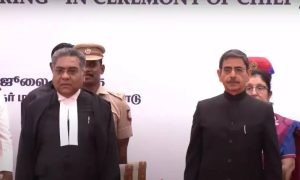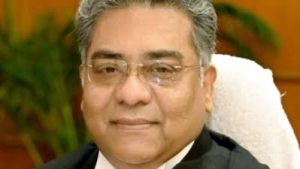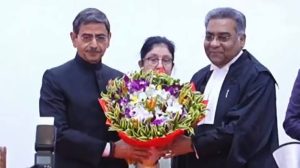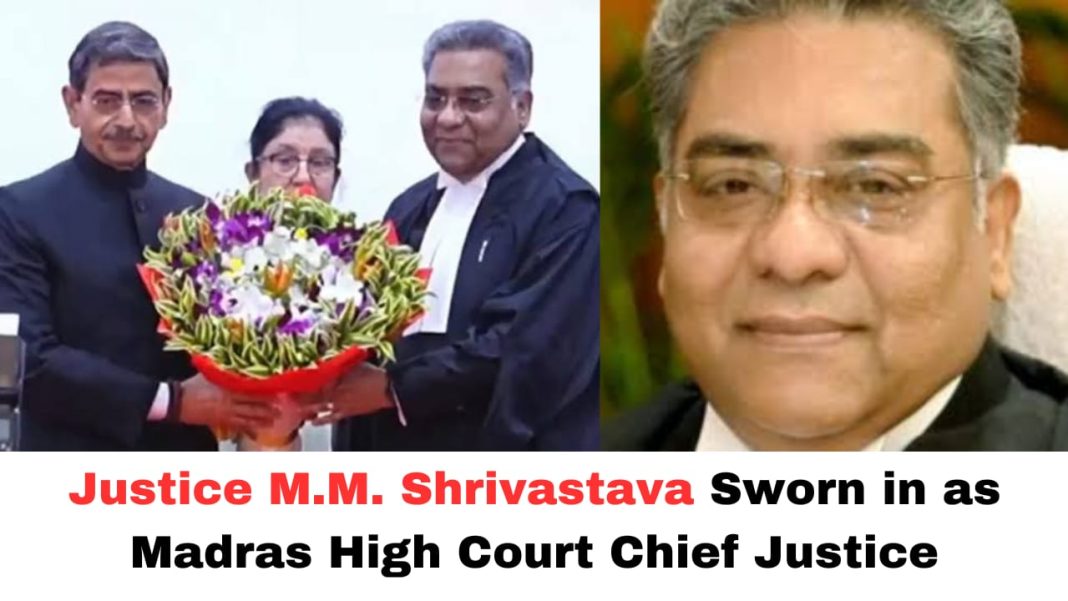Digital News Guru Tamil Nadu Desk:
A New Era at Madras High Court: Justice Shrivastava Takes the Helm
On July 21, 2025, Justice Manindra Mohan Shrivastava was formally sworn in as the 46th Chief Justice of the Madras High Court, succeeding Justice K. R. Shriram, who was transferred to Rajasthan High Court. The swearing-in ceremony, held in Chennai, was attended by dignitaries from across the legal and political spectrum, marking a significant milestone in the court’s evolution.
From Bilaspur to Chennai: A Distinguished Journey
Born on 6 March 1964 in Bilaspur, Chhattisgarh, Shrivastava began his legal career by enrolling with the Madhya Pradesh Bar Council on 5 October 1987. He started practicing at the Raigarh district court and later ventured into the Madras High Courts of Madhya Pradesh and Chhattisgarh.

In 2005, he was designated Senior Advocate, reflecting his growing influence in legal circles. Just four years later, on 10 December 2009, he was elevated to the bench as a Judge of the Chhattisgarh High Court, where he served for nearly 12 years.
On 18 October 2021, Shrivastava was transferred to the Rajasthan High Court, and he ascended to the position of Chief Justice there on 6 February 2024. His performance in Rajasthan was marked by robust judicial oversight, with particular attention to speedy dispensation and special cases requiring urgent attention.
The Collegium-Endorsed Transfer
The Supreme Court Collegium recommended a reshuffle involving high court chief justices on 26 May 2025, which included the transfer of Justice Shrivastava to Madras and Justice K. R. Shriram to Rajasthan. The Ministry of Law and Justice formalized his transfer via a gazette notification dated 14 July 2025, underlined by the Constitutional mandate of Article 222 requiring presidential assent.
New Chief Justice Shrivastava Pledges ‘Voice for the Voiceless’ at Madras HC
In his inaugural address, Chief Justice Shrivastava reaffirmed the Madras High Court’s legacy as a “refuge for the oppressed, a voice for the voiceless, and a watchdog of constitutional morality”. He emphasized that judicial fairness is “the first condition of humanity”, underscoring his dedication to ensuring constitutional protections are not merely theoretical but practically accessible to vulnerable and marginalized communities.
Addressing the legal fraternity, he described the Bar and Bench as “two wheels of the same chariot,” stressing the indispensability of their synergy for swift and fair justice. This synchronicity forms a cornerstone of his judicial philosophy.
Upholding Independence Amidst High Expectations
During the ceremony, Shrivastava acknowledged the profound responsibility entrusted to him by public litigants, the Bar, judiciary, and the administration. He pledged to defend the dignity and independence of the Madras bench, especially at a time when judicial autonomy faces mounting public scrutiny.
Advocate-General P. S. Raman echoed this sentiment, highlighting the deep-rooted traditions of the court. He noted that courtroom halls are graced by lawyers representing multiple generations, including families with up to six generations of legal practitioners.

Implications & Key Priorities
- Access to Justice
- Shrivastava has committed to translating constitutional rights into tangible realities, with a keen focus on those historically marginalized. His diligence could spur procedural reforms to reduce pendency and expedite aid to underprivileged litigants.
- Strengthening the Bar‑Bench Relationship
- His inclusive rhetoric about harmony underscores an intention to foster a culture of mutual respect and collaboration—less about formality, more about trust and teamwork.
- Preserving Judicial Integrity
- As a vocal advocate of judicial independence, Shrivastava’s leadership may fortify internal measures safeguarding the court’s autonomy against external pressures.
- Experience-Driven Verdicts
- With over 15 years of judicial exposure across multiple jurisdictions, Shrivastava’s past rulings—particularly in Rajasthan—are likely to shape future precedents in constitutional and civil liberties law.
Context: A Judicial Shuffle for Strategic Governance
Shrivastava’s transfer is part of a broader judicial realignment intended to balance leadership across high courts and ensure institutional effectiveness. This reshuffle involves:
- K. R. Shriram’s move from Madras to Rajasthan, where he was sworn in on 22 July 2025 and will serve until his retirement on 27 September 2025.
- Similar leadership changes in high courts across Madhya Pradesh, Karnataka, Gauhati, Patna, Jharkhand, Tripura, Telangana, and others.
Looking Ahead
- Steady Tenure Until Retirement: Justice Shrivastava is set to continue as Madras High Court Chief Justice until he retires at the mandatory age of 62, projected to be 6 March 2026.
- Expected Reforms: His early actions—case allocation responsiveness, performance evaluations, and access-to-justice initiatives—will be key indicators of his administrative and judicial approach.
- Elevated National Profile: Given his reputation and seniority, Shrivastava might influence national judicial discourse, especially on issues related to constitutional law and guardianship of civil liberties.

In Conclusion
Justice Manindra Mohan Shrivastava’s appointment affirms the Madras High Court’s tradition of principled and inclusive governance. With his extensive tenure across multiple jurisdictions and unwavering commitment to marginalized communities, he is poised to reinforce the court’s role as a beacon of dignity, fairness, and judicial integrity. His success will be measured not only in verdicts but in the lived justice delivered to those who depend on the courts.
You May Also Read: Vice President Jagdeep Dhankhar Resigns Over Health – Explained








